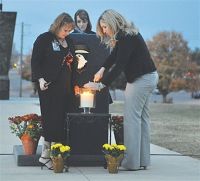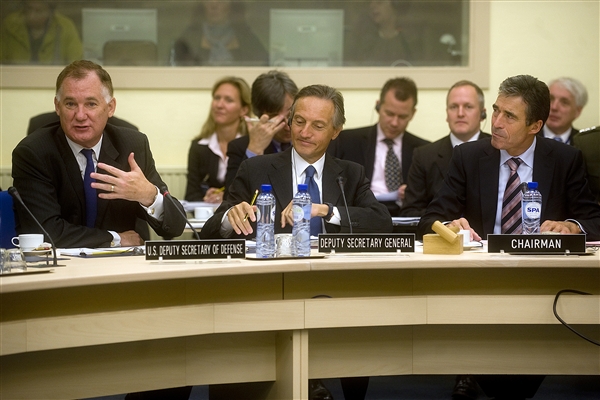WASHINGTON — Inside a one-story building undergoing renovations at the far side of the commissary parking lot here, families of fallen soldiers are getting the support and services they need and reassurance that the Army won’t forget them or their sacrifices.
The building, the new home of Fort Campbell’s Survivor Outreach Services program, offers a haven for about 1,000 Gold Star family members throughout Tennessee and in much of Kentucky. It’s being equipped as a “home away from home,” with a kitchen and dining room, computer room, play area for children, a game room for teenagers and on-site child-care services.
A Hall of Remembrance being built within the facility will honor the fallen servicemembers who have brought these families together. Each family will contribute a photograph of their loved one to be displayed in the hall.
Suzy Yates, interim Survivor Outreach Services program manager, said the idea is to make families feel comfortable and welcomed as they tap into the support, information and services available to help them as they deal with their loss.
The Army launched the program servicewide in October 2008 to enhance its care and support for families of the fallen. Fort Campbell, home of the 101st Airborne Division “Screaming Eagles,” unveiled its own program in 2009, tailoring it to the needs identified by focus groups of surviving family members.
The staff brings a broad range of expertise to help families. Benefits coordinators provide expertise on local, state and federal benefits. Working with casualty assistance officers, they help surviving families apply for benefits they’re entitled to. Financial counselors help them through investment and estate planning. Support coordinators provide long-term support, facilitating support groups, providing life skills education and connecting survivors with counseling resources.
“This should be a one-stop shop for our families, where they can access all the resources available to help them through a difficult time,” Yates said. Meanwhile, the SOS program also offers what Yates said is often the most-valued support service of all: a community of families who share the same sense of loss. “They want to know they are not alone,” she said.
Families take comfort in each other during a host of activities organized through SOS, from support group sessions to candlelight vigils for their loved ones to social events that enable them to let their hair down and have fun. “There’s a sense of understanding they find in each other that creates a very special bond,” Yates said. Sheila Patton, whose son, Army Staff Sgt. James R. “Jimmy” Patton, died April 18 in a helicopter crash in Tikrit, Iraq, serves as senior advisor for Fort Campbell’s SOS program. “This is long-term, and it is much-needed,” she said. “The staff is phenomenal over there. They are doing everything they can for surviving family members: spouses, children, parents, siblings. They are reaching out and trying to touch everyone.”
Yates said the program underscores the Army’s enduring commitment to surviving families. Families “want to know that the Army is not going to forget them,” she said.
“And that is what the Survivor Outreach Services program was put in place to do: stay in contact with families and let them know, ‘Your soldier paid the ultimate sacrifice, and the Army is not going to forget your family,’ ” she added. “We will always take care of you. And there will always be a place for you to go.”
In October, Army Chief of Staff Gen. George W. Casey Jr. emphasized that point to surviving family members attending the Association of the U.S. Army’s Annual Meeting and Exposition in Washington. “You need to know that your loved one’s sacrifice is both recognized and appreciated and won’t be forgotten,” he said.
For Mary Byers, whose son, Army Capt. Joshua Byers, was killed July 23, 2003, by a roadside bomb as he convoyed from Ramadi to Fallujah in Iraq, the SOS program offers a connection to the military she’d thought was lost. Her son, who was assigned to Headquarters Troop, 2nd Battalion, 3rd Armored Calvary Regiment, based at Fort Carson, Colo., was married, which essentially cut his mother and father out of the military’s information and support chain.
“We felt like the military had deserted us,” Byers said. She noted that the military has made amends, now assigning casualty assistance officers to parents of married soldiers and keeping them in the information loop.
Byers, who lives in Nashville, Tenn., said she was thrilled when Fort Campbell’s new SOS program reached out to her and her husband. The staff helped them get passes to drive onto the post without having to check into the visitor’s center every time they attend an SOS function, offered financial planning services, and introduced them to other Gold Star families.
Now Byers attends as many SOS events as possible, and enjoys getting phone calls and friendly e‑mails from the SOS staff to check in on her and see if there’s anything they can do to help. “It means a lot to me to know that somebody cares,” she said. “This connection really means a lot.”
Casey noted at the AUSA convention that the SOS program is still in its infancy and will continue to develop to meet family members’ needs. Recognizing that “grieving is a very individual process,” he said, noting there’s no “cookie-cutter solution” that works for everyone.
Families served through SOS are at different phases of the grieving process, Yates noted. Some are brought to the SOS office by their casualty assistance officer, the pain of their loved one’s funeral still fresh in their minds.
As Fort Campbell’s SOS staff makes contact with families of the fallen in their geographic area –- regardless of what service their loved one served in and whether or not the death was combat related — Yates said she has been surprised to hear from widows dating back to the Vietnam era.
Although the program was initiated to serve families who have lost a servicemember since 9/11, “we do not turn any surviving family member away,” she said. Similarly, there’s no definitive amount of time that families will want to remain connected to the SOS program, Yates added.
“The surviving family determines how much or how little contact they have,” she said. “As they go through the grieving process, it’s all up to them. We will always be there for them, as little or as much as they want. We will be there today, tomorrow, 10 years from now. Whenever they want assistance, we are here for them.”
Source:
U.S. Department of Defense
Office of the Assistant Secretary of Defense (Public Affairs)

 von
von 

